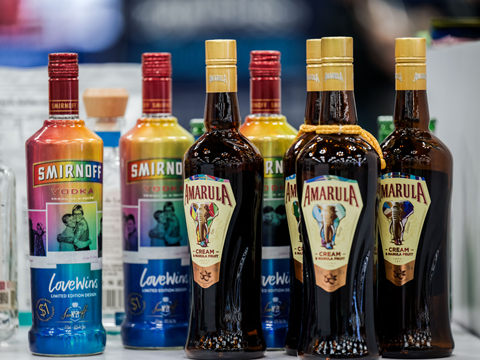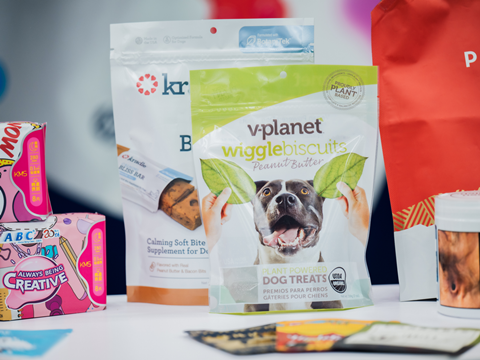
What do advancements in HP Indigo’s labels and flexible packaging division mean for factors like print quality, sustainability, legislative requirements, and product protection? Vice president and general manager Noam Zilbershtain dives deep in this instalment of our ‘In Conversation With…’ series.
HP Indigo believes it can help customers unlock the “label factory of the future” – what would this look like in practice?
The “label factory of the future” is no longer a distant vision. In close collaboration with key workflow, converting and robotics partners, HP Indigo has developed intelligent, highly automated production lines that showcase the future of label manufacturing.
In the label factory of the future, orders are placed online, quoted, and dynamically scheduled for production by MIS solutions such as CERM and Label Traxx. Automated prepress and workflow tools like Esko or Hybrid process more orders and increase speed to press.
Robots supply materials to the production floor, and stock is managed by MIS. HP’s colour system ensures consistent colour throughout the fully automated printing process, with a report generated upon completion.
Converting is managed by connected equipment from partners like ABG and other leading manufacturers. The converting setup is embedded in the print file and “pushed” to and from the production floor via JDF/IMF. A robot packs the finished labels, and shipping information is printed automatically.
While full robotic production is still emerging, as seen at drupa 2024, we are nearing this level of automation. Intelligent production lines, powered by AI, will reduce errors, minimize waste, and improve quality – meeting the need for on-demand label production. With HP Indigo presses and partner networks, the factory of the future is closer than ever.

Can you walk us through the ways HP Indigo’s digital presses aim for high print quality? How do they compare to other solutions on the market?
HP Indigo presses are recognized as the benchmark for gravure or offset matching print quality across the widest range of materials – from paper, film and metallic substrates, carton and beyond. With the highest versatility and the largest global installation base, HP Indigo stands out in the market.
The HP Indigo digital presses rely on a unique printing technology – HP Indigo’s Liquid Electrophotography (LEP). This technology uses thermal offset printing where pigments blend into a smooth film on a heated blanket, then solidify on the substrate with high precision.
Unlike inkjet, LEP directly places ink, allowing for accurate placement even at high speeds. The new LEPx technology, showcased in the HP Indigo V12, delivers digital print quality at analogue speeds of 120 m/min.
HP Indigo print quality and application versatility are complemented by unique software design tools for mass-customized labels and packaging, AI-generated designs, and high-profile campaigns.
A Life Cycle Assessment was conducted on HP Indigo’s digital presses for the production of flexible packaging. Could you run our readers through its key points?
The Life Cycle Assessment (LCA) evaluates the environmental impact of HP Indigo’s flexible digital presses across their entire lifecycle. It provides a comprehensive view of the environmental benefits and areas for improvement, particularly in comparison to traditional printing methods such as gravure and flexographic printing.
The LCA of HP Indigo digital presses for flexible packaging production shows clear environmental benefits, particularly in terms of waste reduction, energy efficiency, and carbon footprint, especially for short-run, on-demand, and customized packaging solutions.
A summary of the key findings of the report includes:
- Carbon Footprint: HP Indigo presses emit fewer greenhouse gases in short to medium runs, thanks to reduced setup and lower energy consumption.
- Energy Efficiency: Optimized for short runs, HP Indigo presses save energy with less downtime between jobs.
- Waste Reduction & Water Usage: Digital printing eliminates the need for plates and reduces ink and substrate waste, especially in short runs. Unlike traditional methods, HP Indigo’s waterless process significantly reduces water consumption.
- Flexibility: On-demand production reduces excess inventory, aligning with market demands while lowering environmental impact.
- End-of-Life and Circularity: HP Indigo has made strides in designing presses that are easier to disassemble, recycle, or refurbish. Additionally, consumables like inks and substrates are being developed with a focus on recyclability and sustainability, contributing to the circular economy.
- Supporting Brands to Lower Environmental Impact: HP Indigo presses support sustainable packaging production with just-in-time printing, waste reduction, and energy efficiency—ideal for brands looking to lower their environmental footprint.

On that note, how could HP Indigo’s solutions help customers in the packaging industry align with the Packaging and Packaging Waste Regulation?
Media accounts for 60-80% of packaging CO2 emissions, while 20-40% is related to the print process and ink. Volume production lines with lengthy delivery times drive high setup waste and inventory obsolescence.
To reduce waste, it’s essential to print only what’s needed, when it’s needed – and this is where HP Indigo presses are perfectly suited. CPG brands save on inventory and reduce obsolescence with on-demand, low- or no-minimum orders, while converters cut setup media waste by -80-90% with no plates required.
Additionally, HP inks are safe for food packaging, work on recycled or compostable materials, and comply with recyclability standards, enabling converters and CPG brands to meet their sustainability goals.
Many HP Indigo-equipped converters can illustrate that digitally produced packaging lowers environmental impact. One of the best examples is ePAC, an all-digital flexible packaging provider with locations across the globe that produces recyclable polyethylene (PE) pouches on-demand.
Foxpak of Ireland has reinvented its business around sustainability, using the HP Indigo 20000 Digital Press and HP Indigo WS6800 Digital Press, to produce digitally printed compostable and recyclable packaging.
Brand protection, authentication, and traceability are becoming increasingly important in the packaging industry. What solutions can HP Indigo offer on that front?
HP works with partners to provide the most secure packaging solutions, helping brands safeguard their products and maintain consumer trust.
- Brand Protection: HP Indigo inks are unique and provide secure printing features that help prevent product counterfeiting and tampering. Brands can incorporate security elements like invisible inks, microtext, QR codes, and holograms directly into the packaging or labels. These elements make it difficult for counterfeiters to replicate products and packaging, protecting brand integrity.
- Authentication: HP Indigo allows for the inclusion of unique identifiers like serial numbers, barcodes, and variable data printing (VDP) on each product or package – visible or invisible. This enables consumers, manufacturers, and distributors to easily verify the authenticity of a product by scanning these identifiers with a mobile device or authentication tool. These features also support anti-diversion efforts by ensuring that products are distributed through authorized channels.
- Traceability: HP Indigo’s real-time printing supports supply chain traceability with serialized data, barcodes, or RFID tags, improving inventory management and recall processes. This level of traceability enhances inventory management, improves recall efficiency, and ensures regulatory compliance.
Why would you recommend HP Indigo to prospective customers in the packaging industry?
The packaging industry currently faces three major challenges: increasing profitability while managing growing production complexity (more jobs, varied media types, and faster delivery), reducing energy and waste to meet sustainability requirements, and attracting and retaining skilled press operators.
HP Indigo and its partner ecosystem enable converters to meet these challenges, from order intake to delivery. A production floor equipped with both HP Indigo and conventional presses ensures the right press is used for each job, maximizing efficiency and profitability for converters.
Digital presses are more appealing to younger operators, reducing labour challenges and aligning with industry trends like AI and robotics. From a sustainability perspective, digital presses require less human intervention and involve simpler setup processes, resulting in fewer errors and significantly less waste.
Ultimately, printing facilities that incorporate both digital and conventional lines are proven to be more profitable. While the packaging industry has traditionally been conservative, embracing digital solutions is key to unlocking profitable growth.
To learn more on HP Indigo’s wide range of Digital Presses for commercial, labels and packaging printing, visit: https://www.hp.com/gb-en/industrial-printers/indigo-digital-presses.html.














No comments yet